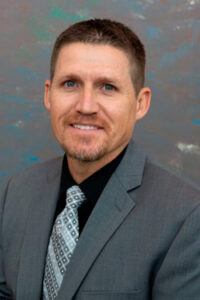
Introduction
Dr. Eric Greska is an Assistant Professor at the University of Delaware, in the Department of Kinesiology & Applied Physiology. His research interests focus on the reduction of lower-extremity injuries and the improvement of physical performance through interventions, as well as the use of technology in assessing post-surgical patient outcomes. He teaches Fundamentals of Anatomy and Physiology 1 & 2, as well as Basic Concepts in Kinesiology.
OER Contributions
Dr. Greska’s contributions to open education resources include a full sixteen-module Anatomy and Physiology course, as well as a lab reference (both are housed on OER Commons.) He utilized the library to find fair use and creative commons images for his resource, as well as other resources that students could access freely. His experience with using these resources has generally been a positive one that he described as “a huge undertaking, but very beneficial.” He also hugely credits colleague Dr. Sheara Williamson, a fellow assistant professor in the department, for her contributions to the creation of these resources at every stage.
When asked how these resources have enhanced his teaching Dr. Greska was enthusiastic, describing being able to adjust materials based on focus; instructors are able to focus on what is necessary and important for their courses. There’s also the convenience of embedding materials in Canvas, where students can always access these materials without leaving the site.
The main benefit, of course, is a reduction in student cost. “Students don’t have any barriers,” Greska said. “[there’s] no fear of students being left behind because they can’t afford something.”
Before and After
“Grade-wise, we have seen an improvement.” Dr. Greska has been assessing each course, and grades have improved. This initiative has also lead to the library’s investing in more resources that students can use for free: for example, interactive video material from Jove, and Primal pictures. “The library had it a long time, but it wasn’t really used.” Greska said. “It’s fantastic material.”
Takeaway
For faculty members who are considering OER, Dr. Greska mentioned that there are a lot of resources out there; “You don’t have to pick a specific one…you aren’t constrained by just a textbook…we’ve also gone to other resources.”
Because of his positive experience with this work, Dr. Greska encourages other faculty members to consider using OER in their teaching.
“You do have to invest time,” Greska said. “But, it ties you back to the material and what you want students to learn…you are guiding what your students are learning, and you can set these outcomes by building up your own materials.”
He encourages interested faculty members to reach out to the subject specialists and CTAL for more help in this area.
For more information on sourcing and using Open Source materials, please contact the library!
